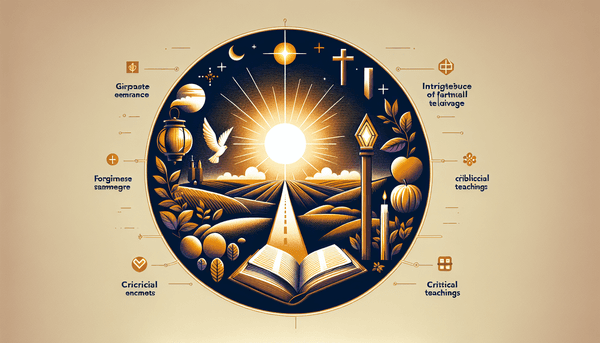Understanding the Sayings of Jesus
In the Gospel of Matthew, Jesus makes a startling prediction to Peter: \"Truly I tell you,\" Jesus answered, \"this very night, before the rooster crows, you will disown me three times.\" (Matthew 26:34) This prophecy, which later comes to pass, serves as a powerful reminder of human frailty and the mercy of Jesus. Further, Christ warns of the danger of empty declarations of faith, saying, \"Not everyone who says to me, 'Lord, Lord,' will enter the kingdom of heaven, but only the one who does the will of my Father who is in heaven.\" (Matthew 7:21) These words underscore the significance of genuine discipleship, which is not merely about vocal proclamations but about living a life that aligns with God's will, as echoed in Luke 6:46 and James 2:26, which stress the importance of deeds as a reflection of true faith.
The Book of Life and Salvation
The concept of the Book of Life is a profound one, symbolizing God's intimate knowledge of those who are His. According to Revelation 20:15, having one's name written in this celestial registry is synonymous with being granted eternal life. The process begins with a sincere faith in Jesus Christ, as John 3:16 points out, that whoever believes in Him shall not perish but have eternal life. This belief is not passive; it is active and transformative, as Ephesians 2:8-9 explains that it is by grace through faith that we are saved, and this is reflected in a life dedicated to the principles taught by Jesus, as those whose names are inscribed in the Book of Life.
Experiencing God's Presence
Feeling the presence of God in one's life is a deeply personal experience, fostered through prayer, meditation, and the support of a faith community. The Bible encourages us to seek God wholeheartedly, as promised in Jeremiah 29:13: \"You will seek me and find me when you seek me with all your heart.\" This closeness is also felt in community, as Christ assures us in Matthew 18:20 that where two or three gather in His name, He is there among them. The connection with God is one that nourishes the soul and provides the strength and guidance necessary to navigate the complexities of life.
Conclusion
This exploration of Jesus' teachings, the nature of repentance, the significance of the Book of Life, the experience of God's presence, and the signs of the Second Coming underscores the richness of biblical doctrine. These elements are not just theological concepts but practical guides for living a life that honors God and prepares one for eternity. As we reflect on these teachings, let us strive to embody the principles Christ set forth, seeking to deepen our relationship with God and live in anticipation of His return, while thoughtfully considering how our faith influences all areas of life, including our entertainment choices.
FAQ
Q: Does God forgive sins if you continue to do them?
A: God's forgiveness is available to all who sincerely seek it through genuine contrition and repentance. True repentance involves a sincere intention to change and live according to God's will. Continually and willfully engaging in the same sinful behaviors without a sincere intention to change can indicate a lack of genuine repentance. As Romans 6:1-2 says, \"Shall we go on sinning so that grace may increase? By no means!\"
Q: What does the Bible say about the signs leading up to the Second Coming of Christ?
A: The Bible describes various signs that may indicate the approach of the Second Coming, including wars, natural disasters, the spread of the Gospel to all nations, and a general increase in wickedness and apostasy. However, the exact timing is unknown, and believers are encouraged to live in a state of readiness and faithfulness (Matthew 24:6-7, Matthew 24:14).
Q: In the Christian faith, what is the 'Book of Life'?
A: In Christianity, the 'Book of Life' is mentioned in the Bible as a record of those who have eternal life through faith in Jesus Christ. Those whose names are written in the Book of Life are those who have trusted in Jesus for salvation and have lived their lives in accordance with God's will (Revelation 20:15, Philippians 4:3).
Q: How can one have their name written in the Book of Life?
A: To have your name written in the Book of Life, you must place your faith and trust in Jesus Christ as your Lord and Savior, acknowledging your sins and believing in His sacrifice for your salvation. Living a life that reflects this faith and following the teachings of Jesus are also integral to this process (John 3:16, Ephesians 2:8-9).






